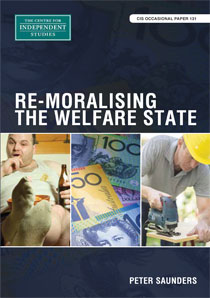
The left thinks high welfare spending signifies compassion. The right believes it rewards irresponsible behaviour. Saunders argues both sides are right.
The left says people who need help must be cared for, irrespective of circumstances. Recent work in evolutionary psychology shows this principle derives from a deep instinct for compassion which we all share.
The right says everyone should pull their weight and nobody should ‘free-ride’. This too is deeply embedded in human instincts — the sense that reward should be in proportion to contribution.
A just welfare system should express both of these moral instincts – caring and proportionality. Saunders spells out how welfare should be organised to achieve this.
First, people who get welfare should not be better off than those who assist them. This applies both to the money they receive, and the free time available to them.
Second, not everyone should be helped in the same way. A moral welfare system demands distinctions between more and less deserving cases.
Third, before anyone calls on the assistance of strangers, they should seek help closer to home. Saunders discusses Germany, where grandparents have a legal obligation to provide for their grandchildren if parents fail to do so.
These three simple rules appeal to our instinctive sense of fairness. Applying them to our welfare system would ensure it is just as well as compassionate.











